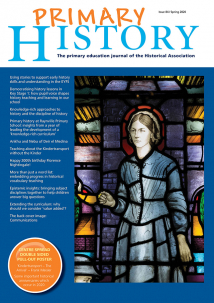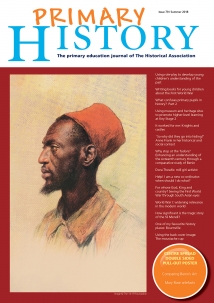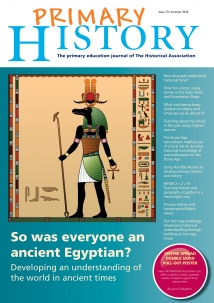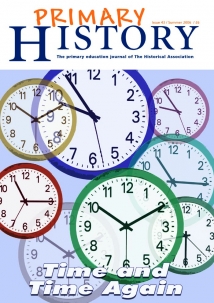Historical Knowledge and Understanding including Concepts
Useful articles in 'Primary History'
|
Each section of this unit begins by highlighting articles based on the current National Curriculum, and is followed by earlier pieces that are still worth reading. Please note that while the core advice is still relevant, articles from editions published prior to Primary History 66 will be based on the old National Curriculum. |
1. Knowledge including terms and vocabulary
2. How children learn in history
3. Time and chronology
4. Disciplinary concepts
1. Knowledge including Terms and Vocabulary

- Rachelle Blagdon, ‘Keeping children motivated in primary history whilst ensuring they can recall what they have been taught: The importance of reinforcement’, PH 94, summer 2023
- Kate Rigby, ‘Supporting colleagues to develop their subject knowledge – the role of the subject leader’ PH 88, summer 2021. Examples of Ancient Egypt
- Tim Lomas, ‘Back to Basics: How might we organise historical knowledge? Are knowledge organisers the way forward in primary history?’ PH 88, summer 2021
- Ailsa Fiddler, ‘More than just a word list: embedding progress in historical vocabulary teaching’ PH 84, spring 2020
- Robbie Burns, ‘Primary history at Raynville Primary School: insights from a year of leading the development of a knowledge-rich curriculum’ PH 84, spring 2020
- Matthew Sossick, ‘Knowledge-rich approaches to history and the discipline of history’ PH 84, spring 2020
- Stuart Tiffany, ‘Subject leaders site: the importance of subject knowledge’ PH 83, autumn 2019
- Steve Davy, ‘The importance of historical vocabulary’ PH 70, summer 2015
- ‘Key historical vocabulary in KS1 and KS2’. Poster in PH 69, spring 2015.
Also:
- Alan Hodkinson, ‘History Howlers. Amusing Anecdotes or Symptoms of the Difficulties Children have in the Retention and Ordering of Historical Knowledge’, PH 32, autumn 2002. Children’s abilities and problems with retaining historical knowledge.
- Jon Nichol, ‘Academic and Teaching Subject Knowledge and Key Stage 2’, PH 27, January 2001. Example of the Reformation.
2. How children learn in history:

- Susie Townsend, ‘Developing disciplinary knowledge: pulling up the portcullis to explore how and why castles and forts developed’, PH 99, spring 2025
- Rachelle Blagdon, ‘Keeping children motivated in primary history whilst ensuring they can recall what they have been taught: The importance of reinforcement’, PH 94, summer 2023
- Tim Lomas, ‘Getting to grips with concepts in primary history’ PH 82, summer 2019.
- Tim Lomas, ‘What confuses primary pupils in history? Part 2’ PH 79, summer 2018
- Tim Lomas, ‘What confuses primary pupils in history? Part 1’ PH 78, spring 2018
- Tim Lomas, ‘What confuses primary children in history and what can we do about it? PH 73, summer 2016
Also:
- Hilary Cooper and Jon Nichol, ‘Teaching history as a national grand narrative’ PH 64, summer 2013
- Hilary Cooper, ‘Children’s Thinking and History’ PH 64, summer 2013
- Gloria Sole, ‘Promoting creativity, empathy and historical imagination: early years students learning the topic Portuguese discoverers’ PH 63, spring 2013
- Hilary Cooper, ‘Children’s Thinking. Developmental Psychology and History Education’ PH 57, spring 2011.
- A Blake, L D Newton, D R Newton and R Brown, ‘But why did Guy Fawkes try to blow up the king, Miss? Investigating support for explanatory understanding in primary history books’, PH 34, spring 2003. Explores the idea of historical understanding.
- Lynn Newton, ‘Teaching with Meaning: Supporting Historical Understanding in the Primary Classroom’, PH 31, Spring 2002. How teachers can help children understand historical events
- Margaret Parsons, ‘Asking the Right Questions: A Study of the Ability of Key Stage 2 Children to Devise and Use Questions as Part of their own Research’, PH 26, October 2000.
- ‘Addressing the Issues of Knowledge, Skills and Understanding’, PH 25 special edition: effective practice in the primary history curriculum 2000. Although aimed at the 2000 NC orders much is still relevant. Covers concepts of change, causation, interpretations, enquiry, source work, organisation and communication, independence, visual material, speaking and listening and significance’
3. Time and Chronology:

- Jo Pearson, ‘Planning for progression and sequencing in primary history’, PH 98, autumn 2024.
- Matthew Sossick, ‘Timelines in teaching history’ PH 92, autumn 2022.
- Alison Mansell, ‘The potty timeline: an effective way of using timelines’ PH 80, autumn 2018.
- Marjan de Groot-Reuvekamp and Penelope Harnett, ‘How do pupils understand historical time? Some evidence from England and the Netherlands’ PH 73, summer 2016
- Hilary Cooper, ‘Chronology: Developing a coherent knowledge and understanding of Britain’s past and the wider world’ PH 67, summer 2014.
Also:
- Hugh Moore, ‘Creative chronological thinking’ PH 63, spring 2013
- James Percival, ‘Developing chronological understanding through the use of ICT’ PH 62, autumn 2013.
- Matthew Sossick, ‘Big Timelines, Bigger Pictures’ PH 59, autumn 2011. How to think big about chronology.
- Barbara Sands, ‘Chronology and Topics at KS2: The Nearly Complete History of Almost Everything’ PH 59, autumn 2011. Planning to develop a sense of time.
- Pat Hoodless, ‘Time, chronology, language and story’ PH 59, autumn 2011. How to develop chronological understanding.
- Alan Hodkinson, ‘Enhancing temporal cognition: Practical activities for the primary classroom’ PH 59, autumn 2011. Developing a sense of time.
- Keith C Barton, ‘Enriching young children’s understanding of time’ PH 59, autumn 2011.
- Hilary Cooper, ‘What understanding of chronology can we expect of older primary school children?’ PH 59, autumn 2011.
- Cathie McIlroy, ‘A View from the Classroom’ PH 59, autumn 2011. Chronology.
- Michael Maddison, ‘Developing Pupils’ Chronological Understanding: The View from Ofsted’ PH 59, autumn 2011.
- John Fines, ‘Teaching Time’ PH 59, autumn 2011.
- Gillian Waters and Vanessa Kyle, ‘Exploring chronology in a museum’ PH 59, autumn 2011.
- Andy Reynolds and Alan Hodkinson, ‘How to teach Chronology’, PH 57, spring 2011.
- Alan Hodkinson, ‘Planning for Chronological Understanding: Areas of Learning and the Development of Effective Practice’ PH 53, autumn 2009.
- Keith C Barton, ‘Helping students make sense of historical time’ PH 37, summer 2004.
- Alan Hodkinson, ‘Enhancing Temporal Cognition, Practical Activities for the Primary Classroom’, PH 28, May 2001. Developing chronology.
- Pat Hoodless, ‘Why teach about Time in the Primary School?’, PH 17, November 1997.
- Harriet Martin, ‘Timelines and Reference Books’, PH 15, February 1997.
4. Disciplinary Concepts:

- Ailsa Fidler and Chris Russell, ‘What’s so important about Sources and evidence’ PH 95, autumn 2023
- Tim Lomas, ‘What is so important about interpretations?’ PH 94, summer 2023
- Polly Gillow, ‘Significance: how can pupils ask questions about the past and tie it to their present experiences?’ PH 93, spring 2023
- Glenn Carter, ‘Significance and interpretation: what are these concepts and why are they important in primary history?’ PH, 90, spring 2022
- Matthew Sossick, ‘Pandemics in history: similarity and difference’ PH 85, Summer 2020
- Kerry Somers, ‘How significant is the tragic story of the SS Mendi? Using Christine Counsell’s 5Rs of significance’ PH 79, summer 2018.
Also:
- Carole French, ‘Who? What? Why? Historical Significance’ (In my View), PH 43, summer 2006.
- Gavin Baldwin, ‘Historical Interpretations’, PH 33, winter 2003.
- Pat Hoodless, ‘Investigating Children’s Awareness of Changing Values and Attitudes through Stories written in the Past’, PH 41, autumn 2005.

